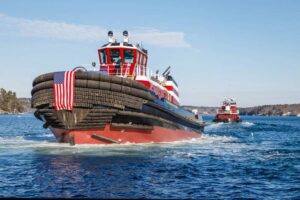Today, I serve as Vice President and General Manager of McAllister Towing in Puerto Rico. From this vantage point, I’ve seen how vital the Jones Act is —not only to the maritime workforce, but to price stability, supply reliability, and the economic health of both Puerto Rico and states like Connecticut.
The Connecticut General Assembly is currently considering a resolution urging Congress to amend the Jones Act “to improve economic and trade relations between the state of Connecticut and Puerto Rico.” While I share the goal of strengthening that connection, weakening the Jones Act would do the opposite. It would undermine the framework that has supported opportunity and reliable trade between our regions for generations.
McAllister Towing, with over 160 years of continuous American ownership, has operated in Puerto Rico for more than 50 years. In that time, we’ve provided stable, well-paying maritime careers to generations of Puerto Rican mariners —jobs protected by the Jones Act. These aren’t short-term roles; they’re long-term careers that support local families and the island’s economy.
But the Jones Act is about more than employment. It delivers critical operational and economic advantages that often go unrecognized.
Unlike many foreign carriers, Jones Act operators are fully integrated into the U.S. intermodal logistics system. We use 45-, 48-, and 53-foot containers —larger than the international 40-foot standard— so more cargo moves per trip, reducing per-unit transportation costs. These savings are real, and they benefit Puerto Rican businesses and consumers.
Schedule reliability is another key strength. Jones Act carriers offer multiple sailings per week, with on-time arrivals measured in hours, not days. That consistency enables businesses in Puerto Rico to manage leaner inventories, reduce warehouse space, and lower property tax exposure —leading to more efficient, cost-effective operations.
Another major benefit is rate stability. During the pandemic, international container rates surged —from about $3,000 to over $25,000. In contrast, Jones Act carriers kept rates stable, helping protect Puerto Rican businesses from the chaos seen in global shipping. Predictable rates matter —especially for small and mid-sized importers.

Critics claim the Jones Act raises consumer prices in Puerto Rico. But that argument doesn’t hold up. The U.S. Government Accountability Office found no clear evidence that the Jones Act increases retail prices. Shipping costs are a small part of what consumers pay. Far more impactful are Puerto Rico’s high utility costs, which drive up overhead across food storage, refrigeration, and distribution.
We’ve also seen what happens when the Jones Act doesn’t apply. In parts of the Caribbean, inter-island shipping jobs have increasingly gone to foreign mariners from countries with lower wages and limited protections. Without the Jones Act, Puerto Rican seafarers would likely face the same displacement.
Beyond economics, the Jones Act is vital to national security. It ensures only U.S.-built, -owned, and -crewed vessels transport cargo between U.S. ports—keeping our domestic supply chain under American control. During the pandemic and other periods of global disruption, this capability proved essential—not just symbolic.
Connecticut also has a stake in preserving the Jones Act. It supports more than $1.7 billion in annual economic activity and over 6,500 maritime jobs in the state. Weakening it would open U.S. trade routes to foreign operators, undercut American workers, and weaken the maritime industry both states rely on.
Connecticut is right to pursue stronger trade with Puerto Rico—but dismantling the Jones Act is not the way to do it. It won’t reduce prices. It will offshore jobs, destabilize local supply chains, and leave U.S. commerce exposed to foreign volatility.
The Jones Act works. It creates jobs, keeps costs stable, and ensures reliable delivery of goods across the U.S. and its territories. Rather than weaken it, we should protect and strengthen the system it upholds.
Jaime Santiago is Vice President and General Manager of McAllister Towing in Puerto Rico.
This article first appeared on CT Mirror and is republished here under a Creative Commons Attribution-NoDerivatives 4.0 International License.
